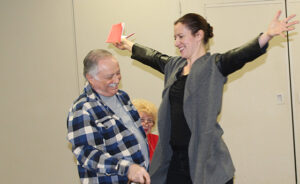 “Never again!” Words with which we are familiar and words we say. But, what do they mean in our contemporary world? What does it mean to be a Jew in America, specifically in the affluent suburb of Beverly Hills in 1983? “Long After Crystal Night,” a play by John Herman Shaner, examines these questions through the lives of the Seymour Goldstein family. The play takes place over a weekend, during which we find the family struggling with whether members of the Jewish Defense League (JDL)—violent Jewish militants—should be allowed to speak at the local B’nai B’rith Lodge, warning the members about an upcoming meeting of the American Nazi Party (ANP). The ANP’s inflammatory message is that the Holocaust never happened.
“Never again!” Words with which we are familiar and words we say. But, what do they mean in our contemporary world? What does it mean to be a Jew in America, specifically in the affluent suburb of Beverly Hills in 1983? “Long After Crystal Night,” a play by John Herman Shaner, examines these questions through the lives of the Seymour Goldstein family. The play takes place over a weekend, during which we find the family struggling with whether members of the Jewish Defense League (JDL)—violent Jewish militants—should be allowed to speak at the local B’nai B’rith Lodge, warning the members about an upcoming meeting of the American Nazi Party (ANP). The ANP’s inflammatory message is that the Holocaust never happened.
Seymour Goldstein, a mild-mannered Jew, lives in Beverly Hills with his wife, Joyce, and son Keith. Seymour is a successful businessman; and he and his family consider themselves assimilated. His brother, Jacob Goldstein, has so fully assimilated, he changed his name to Jerry Gardner. At least they think they are fully assimilated. After his initial discussions with the JDL, Seymour begins to reminisce about his youth and how he never fought back, even when faced with physical assault. He questions why he did not fight back, or at least confront bullies who belittled him because he was a Jew. He struggles with being “assimilated” and his Jewish identity within. When Seymour tells his wife that she is “totally assimilated” she replies by saying “I wouldn’t mind being a White Anglo-Saxon Protestant a while. But every time I come close, some lunatic bombs a synagogue in San Francisco,1” leading us to believe that, although seemingly assimilated, they are Jews at the core. Despite their desire to “white-wash” their Jewish roots, anti-Semitism and anti-Semitic acts are recurrent reminders of who they are. Seymour goes on to state that he is a “good Jewish boy . . . Someone who’s scared all the time.2” Seymour’s statement is justified. One just needs to pick up a history book to read about the persecution of Jews throughout the years: Crusades, pogroms—all frightening—but, none more horrifying than the Holocaust.
As the play unfolds, it is easy to harken back to the days of Nazi expansion and occupation. Is this how it started—anti-Semitic meetings followed by a propaganda campaign, motivating those vulnerable to suggestion to enact hate crimes? When confronted with anti-Semitism in your backyard, what do you do? When do you start to fight back? How do you fight back? How aggressive should that fight be?
These are all questions that we reconsidered when this play was chosen for the JFed Players’ Spring production. Additionally, numerous discussions regarding “Long After Crystal Night” took place, focusing on the relevance of the play and the questions it raises. The rising tide of anti-Semitism around the world today does not approach levels of persecution Jews have faced throughout history, but it cannot be ignored. And this, more than 70 years after the end of World War II. The mission of the JFed Players, in addition to performing works by Jewish authors and composers, is to bring relevant plays with Jewish themes to the community. What better vehicle than a play about “never again!” and a family struggling with the question of what this means to each of us?
Although this is a story about a Jewish family in 1983 Beverly Hills, the questions it raises are relevant to any race, religion, or ethnicity, anyone who is a victim of bigotry and bias. How far does anyone go to ensure that these types of atrocities will “never again” occur? In times of intolerance, what does resistance mean? This compelling play, emotionally resonant and full of humor, is as relevant today as it was in 1983.
LORI MCKENNA IS A CONTRIBUTING WRITER TO JLIFE MAGAZINE.









